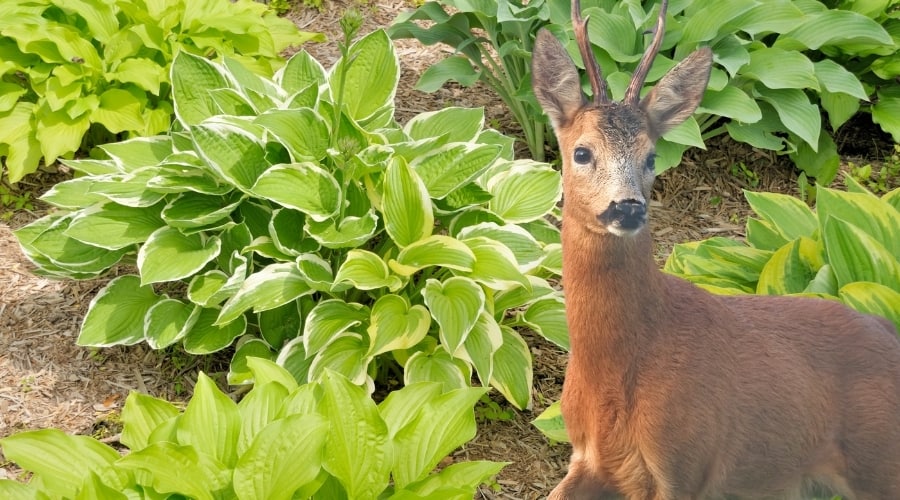If you have a garden or landscaped area full of foliage, seeing deer can mean losing the plants you want to keep. A single deer can eat two to five pounds of plant matter every day, which is enough to destroy a decorative border of Hostas or strip a bush bare.
Deer will eat any of the 3,100 varieties of Hostas plants. Not only do deer love the taste of Hostas plants, but they will also eat the so-called deer-resistant varieties if they are hungry enough. A hungry deer will strip all the leaves off the Hostas, leaving only the stems and roots behind.
Table of Contents
Do Deer Like To Eat Hostas
A hungry deer will eat just about any plant. There are even some accounts of deer eating small birds.
However, some foods are better than others. If you notice the deer making a beeline to your Hostas, it is because they genuinely like eating them.
The flavor is something many of these majestic, yet garden-destroying animals enjoy.
Why Do Deer Eat My Hostas
If you have a lush landscape and deer, you may have noticed they are especially fond of your Hostas. The Hosta is like candy to deer.
Evidently, the flavor of these lovely greens is one that the animals enjoy immensely, so they seek them out.
Which Hostas Do Deer Like The Most
Although a deer will eat any Hostas, it comes across; some are tastier than others. Hostas that are flowering are a more likely target for deer because the bright blooms draw them to the plant.
Like most animals, deer have a better sense of smell than humans, and as a result, they can catch a whiff of the blooms at a distance.
The other type of Hostas deer seem to eat most often are those with non-variegated leaves. A plain, solid color green leaf Hosta is a favorite meal for visiting deer.
Do Deer Eat All Hostas
Although deer, like all creatures, have food preferences, Hostas are on the menu. The only type of Hosta a deer won’t eat is the plastic kind.
It is crucial to protect your garden from wandering animals unless you don’t mind sharing your Hostas.
Do Deer Eat Hostas Leaves
When deer decide to make a meal out of your Hostas, they only eat the leaves. The animal will leave the stems mostly intact.
That can be good news since hardy Hostas want to live. With luck, your plants will regrow new leaves over time.
Hostas will return so long as the roots are intact. Better still, they can make new leaves in as little as one to two months during the growing season.
Sadly, if deer eat your Hostas late in the season, you may need to wait until next year to see them return to their former glory.
Signs A Deer Has Been Eating Your Hostas
When insects eat your plants, they leave holes in the leaves. When leafcutter or other ants go after them, it will seem like small sections go missing from the edges, or entire tiny leaves will be missing.
However, if you have deer, then the plant will most likely be stripped completely bare. Fortunately, deer will leave the roots and stems intact so the plant can regrow over time.
What Hostas Will Deer Not Eat
The only Hostas a deer will refuse are the ones they can’t reach. If you put the plants somewhere prohibitive, they’ll be safe.
Strongly scented companion plants such as garlic can help make the Hosta beds undesirable. Most deer don’t enjoy getting a mouth full of pungent, unpleasant leaves to grab a snack.
Are Hostas Deer Resistant
Don’t fall for dishonest marketing tactics. Deer love to eat Hostas, and that means all the Hostas.
If you come across a variety that is listed as deer resistant, at best, it has variegated leaves and might be the second choice if a more desirable Hosta is right beside it.
Sadly, at worst, it’s just an outright lie to tempt people to buy Hostas they will need to replace often. That will pad a sellers’ pocket, but it won’t make your Hostas less snack worthy.
What Can You Spray On Hostas To Keep Deer Away
I strongly recommend odor repellents that interfere with the animal’s sense of smell. Scented deer deterrents are the best all-season method to keep deer away.
There are plenty of spray-on deterrent options to protect your Hostas. Some last all year, and others require re-application, but all of them will make those Hostas into a not-so-deer-friendly non-snack.
- You can start with commercial deer/rabbit odor clips, like this product from Luster Leaf.
- Ready to Use Organic Repellent Odor Clips, 25pk in Green color
- No Spray! Simply clip directly to plant or create a barrier on a fence or plant support
- Proven Garlic odor repels Deer, Rabbits and other animals
- 100% Organic Formula
- 25 pack for use around homes and gardens
Last update on 2024-04-26 / Affiliate links / Images from Amazon Product Advertising API
- Natural solutions such as garlic essential oil are easy to mix at home. The downside to this method is that you need to reapply frequently.
- Unpleasant tasting sprays can also work. Cayenne or other spicy peppers in water will make the Hostas taste bad to deer.
- Chemical deer repellant works well. Options like Liquid Fence are well known for keeping these foragers at bay.
- REPELS DEER AND RABBITS: Deer and rabbits don’t have to eat vegetation for the repellent to be effective—they have a natural aversion to the scent
- SPRAY ON PLANTS: Use to treat landscaped ornamental gardens, flowers, shrubs, trees and vines
- RAIN RESISTANT: Ready-to-use liquid formula starts to work immediately
- HARMLESS TO PLANTS AND ANIMALS: Won’t harm plants and animals when used and stored as directed
- APPLY YEAR-ROUND: No need to rotate with other repellent brands – animals’ natural aversion to Liquid Fence Deer and Rabbit Repellent Ready-to-Use2 will never diminish
Last update on 2024-04-26 / Affiliate links / Images from Amazon Product Advertising API
- Hanging bars of bad-smelling soap in your garden will do the trick. The more pungent the odor, the more effective it is. You can actually purchase lots of these at your local grocer, cut them into small pieces, and hang them in cheesecloth or burlap.
- If you can’t obtain the commercial odor repellents, you can go for perennial herbs like artemisia, yarrow, and tansy. Culinary herbs like mint, thyme, chives, tarragon, dill, tarragon, and oregano produce similar results if planted throughout your garden. Deer are particularly turned off with the smell of garlic, sage, rosemary, lavender, mint, and thyme, so you can add a few of these in there.
How Do You Keep Deer Away From Hostas
There are other ways to hide your Hostas from deer for gardeners and landscapers who don’t like the idea of sprays.
Fences and walls may seem the obvious solution, but deer are champion jumpers. A white-tailed deer can leap eight feet, so you need a tall solution.
If you want to put up a fence on a budget, then you to go for a more inexpensive deer netting options sold in most home-and-garden stores.
They are often labeled as “bird netting” and normally come in a not-so-strong 1″ X 1″ square mesh. Still, you can go for polypropylene mesh that consists of thicker strands in 2″ x 2″ (approx.) mesh.
Either way, buy something that’s easier to handle and one that lasts reasonably longer. Regardless of the type of fence you install, it must be 8 feet tall or more if you want to completely lock out the deer.
Garden netting can help, but it also prevents you from seeing your plants in all their glory.
A better solution is to spray predator urine around the edges of your property. While you do need to reapply this solution throughout the growing season, deer would need to be starving to risk encountering an animal that will eat them.
You can add statues of predators in the garden to scare deer away. This is especially useful if you also use the predator-urine trick.
Just like scarecrows, these fake scare-deer animals will significantly cut the number of Hostas you lose. Both decoy animals and bottled predator urine are easily available online.
Additionally, you can help prevent the problem with clever planting. Add lavender or garlic to your Hosta beds, or vice versa.
The strong smells deter deer who don’t want to risk an accidental mouthful of the strong scented and flavored plants.
The best way to protect your Hostas from deer is to plant them with companion plants that deer dislike. Some of these companion plants are perennials that easily thrive, even in the fall.
However, this method may not work as desired if you plant them too late when the deer have already discovered your Hostas because they will simply avoid the deterrent plants and keep eating your Hostas.
Human noses are relatively weak, and while deer are nowhere near as talented as a bloodhound, they have a sense of smell that is about eight hundred times that of any human.
Deer also have a Vomeronasal Organ, sometimes called the Jacobson’s Organ, in the roof of their mouths. This unique scent receptor helps many animals to use their sense of smell to ‘see’ their surrounding in a way we cannot perceive.
Will Hostas Grow Back After Deer Eat Them
Unless the deer in question did more damage than usual, your Hostas will grow back as beautiful as ever.
Moreover, since they are fast-growing plants, it will only be a few weeks before you see those lush leaves again during the peak growing season.
They are quite hardy and will regrow if they are eaten two, three, or four times even in the fall or winter. If you don’t protect the plants, deer may come back and eat the new growth as fast as it happens, leaving you with Hosta stems.
However, they may never regrow if they are eaten repeatedly for a long time. I would recommend that you take every measure you can to keep deer at bay as early as possible to avoid stunting your plants.
Helpful Tips To Know About Deer Eating Hostas
Are the deer in your area especially stubborn? I have some additional tips to help you with Hosta-eating deer.
Hopefully, a combination of tactics will help you keep your beautiful greenery intact this season.
- Motion detector lights will help you keep the deer out in the evening and early mornings. Deer spook easily.
- If you have a dog, let them out more often. Not only will they take care of the predator-pee for you, but they bark and chase deer away as well. This method is not foolproof as some deer and dogs can become friendly.
- Try planting your Hostas closer to your home. Since deer are naturally wary, they may not be willing to venture up to your porch steps for a snack.
- Put Hostas in an enclosed porch, greenhouse, or consider keeping them as indoor potted plants. However, it is essential to keep in mind that the roots and flowers of Hostas are poisonous to dogs and cats. Be very careful with plants around your pets.
Final Thoughts
If you have Hostas and deer can reach them, those deer are going to eat your Hostas. Since this particular plant is like a sweet treat to the deer, they are more likely to seek them out.
All you can do is protect your Hostas with fences, walls, or a wide border of other, less desirable plants.



